
Tell us what you need to find a matching loft conversion specialist

Get free quotes from professionals near you

Compare offers and choose the one that best matches your need
- Householdquotes.co.uk
- Driveway
- Driveway Materials
- Gravel Driveway
Your Complete Guide to Gravel Driveway


- The cost of a gravel driveway varies based on size, design complexity, and materials, but the average cost is £2,500, making it the most affordable option.
- Installing gravel on a driveway is an easy and cost-effective way to improve drainage, reduce long-term costs, and facilitate maintenance and repairs.
- Adding a weed barrier and sub-base is essential before adding gravel to a driveway. These prevent the growth of weeds and ensure that your driveway can withstand heavy traffic.
Are you looking for a practical, budget-friendly, stylish driveway option to enhance your property's value and curb appeal? Look no further than gravel driveways! They offer a timeless charm that never goes out of style and can transform the look of your home.
Gravel driveways are not only cost-effective but also easy to install and maintain, making them a popular choice among UK homeowners. Their durability and longevity make them an excellent investment that can withstand heavy use and harsh weather conditions.
If you're considering a new driveway that is cost-effective and low-maintenance, gravel driveways are your best bet. Our comprehensive guide covers everything you need to know, from selecting the right type of gravel to preparing the ground and installing the driveway. We'll also discuss the advantages and disadvantages of gravel driveways and share expert tips to help you maintain your driveway in top condition for years.
Take advantage of the opportunity to transform your driveway and give your home a brand-new look. But save your time researching and comparing quotes from different contractors. Instead, let HouseHold Quotes do the work for you.
Our tailored quotes ensure you get the best deal from reputable driveway installers in your area. And the best part? It's completely free of charge and obligation. Fill out our 30-second survey by clicking the button below. Don't wait any longer to transform your driveway!
- Describe your needs
- Get free quotes
- Choose the best offer
It only takes 30 seconds

- What is a gravel driveway
- What are the pros and cons of a gravel driveway
- What is the best gravel for driveways
- What are the layers of a gravel driveway
- What is the recommended gravel size for driveways
- Do you need a gravel grid for your driveway
- How much do gravel driveways cost
- What are the regulations for gravel driveways in the UK
- FAQ
What is a gravel driveway?
A gravel driveway is made of loose aggregate materials such as gravel, crushed stone, or pebbles. These materials are often limestone, basalt, or sandstone but can also be marble, slate, or quartzite. Gravel driveways are created by spreading the materials evenly over a prepared base, which helps with drainage and contributes to the driveway's durability and longevity. With proper care and maintenance, gravel on a driveway can last up to 100 years, according to Bray Topsoil & Gravel.
These advantages and their cost-effectiveness make them one of the most popular driveway surfaces in the UK. Driveway gravel is typically made one of two ways:
- Manufactured gravel
- Naturally formed gravel
Manufactured gravel is produced by collecting stones from quarries, which are crushed by heavy machinery to create thick, sharply-edged gravel. It is the best gravel for driveways as it is stronger and less prone to movement than naturally formed gravel.
Naturally formed gravel is created by the breakdown and shaping of rocks through water pressure in riverbeds. This process results in uniquely coloured and rounded stones.
What is the difference between a shingle and a gravel driveway?
Shingle and gravel are often used interchangeably when creating driveways, paths, or patios. However, there are some differences between them that will affect the strength and durability of your driveway. Knowing these differences will help you make an informed decision about your gravel driveway.
Shingle driveways are made from small, smooth pebbles that are naturally weathered and commonly found on beaches. It comes in a range of colours and can create a beautiful and attractive entryway when used on a driveway.
While shingle provides excellent drainage, it is not commonly used for driveways as the smooth pebbles are less robust than thicker, rougher stones.
Gravel is a better choice for driveways than shingles. It is denser and sharper in texture, which provides a strong foundation capable of holding heavy loads. The gravel's rough edges also prevent it from shifting or moving around.
What are the pros and cons of a gravel driveway?
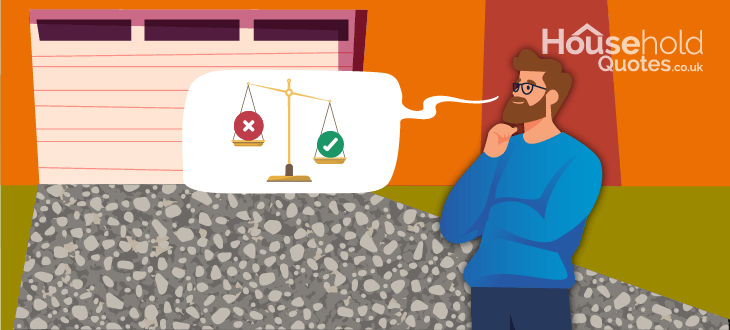
There are many driveway types to choose from, yet gravel for driveways are one of the most popular types available in the UK. Understanding the advantages and disadvantages of having a gravel driveway before deciding is essential.
By thoughtfully considering the positive and negative aspects, you can determine whether a gravel driveway is affordable, suitable for your lifestyle, and meets your property requirements. This will enable you to make a well-informed choice that aligns with your circumstances.
- Affordable: Gravel is a cost-effective material that is easily sourced, making it an ideal choice for driveways.
- Easy installation: Gravel driveways can be installed within one to two days, making them one of the quickest types of driveways. This easy installation process can save you time and money on labour costs.
- Excellent drainage: Gravel’s porous nature allows rainwater to pass through, preventing puddles and flooding around homes. This makes it particularly beneficial for areas in the UK with heavy rainfall.
- Easy to repair: Damaged gravel can be easily repaired by adding more gravel, which is quick and cost-effective compared to other types of driveways.
- Easily compact: With usage, the stones for these driveways naturally compact, creating a stable and durable surface.
- Acts as a crime deterrent: Gravel produces noise when walked on. This deters burglars and makes it less likely for them to approach homes or cars with gravel driveways.
- Maintenance: Regular maintenance is necessary to keep gravel on a driveway looking fresh. This includes filling potholes with more gravel and levelling the surface as needed.
- Weed growth: Without a weed barrier, driveway maintenance increases as weeds grow through the porous, loose stones.
- Uneven surface: The driveway’s loose gravel creates an uneven surface, making it difficult for people to move around safely, especially those using mobility aids.
- Prone to washing away: During heavy rain, gravel may wash away, exposing the sub-base and creating an eyesore. Additional replenishment is required after heavy rainfall, which increases maintenance requirements.
What is the best gravel for driveways?
When it comes to choosing the best gravel for a driveway, several factors must be considered. The gravel's type, size, and colour can all impact your driveway's overall look, durability, and performance. However, it is also essential to consider your preferences when choosing the best driveway stone for your home.
Below are the types of gravel you can choose to add to your driveway:
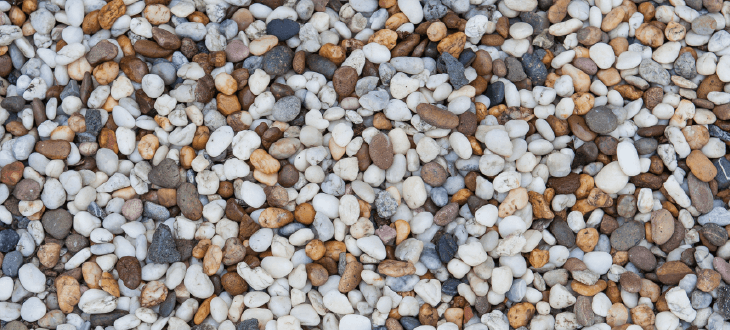
Pea gravel or shingle gravel is a type of small, rounded stone naturally weathered to the size of a pea. Its smooth, polished, and versatile appearance makes it a popular choice for decorative purposes.
It is not typically used for driveways because it is less stable than other types of gravel. It can be prone to shifting or moving under heavy use.
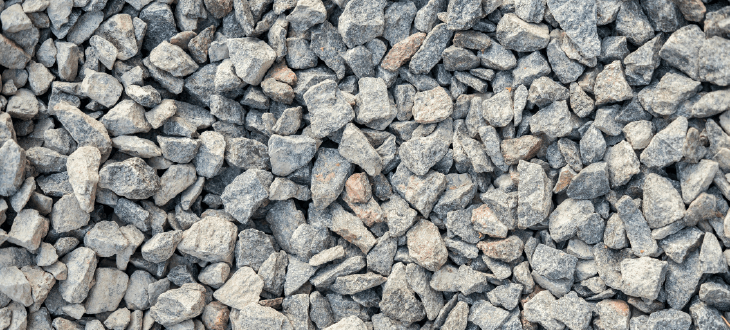
Crushed rock is the most commonly used type of gravel for driveways as it is durable and the cheapest gravel material. It is produced by breaking down large rocks into smaller pieces in quarries. Crushed stone comes in various sizes and shapes, ranging from tiny particles to larger stones. It is an ideal choice if you are looking for a durable and long-lasting driveway.
However, one drawback of crushed rock is that it is less visually appealing than other types of driveway stones. Additionally, it tends to create dust, which can affect the overall appearance and pose a risk to people with allergies.
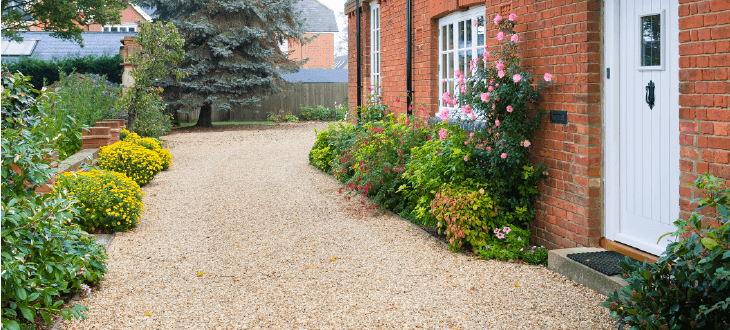
Self-binding gravel combines small stones, clay, and sand that naturally bind together to create a stable surface. This surface is resistant to shifting, which reduces the risk of slipping. It is an excellent choice for creating long-lasting and low-maintenance driveways.
However, it is essential to note that while this driveway surface is the best option to prevent shifting, it will still move over time. Also, the small stones in the gravel can stick to the soles of shoes and be carried indoors.
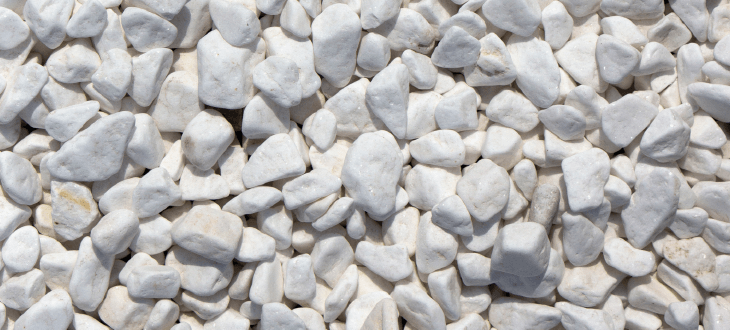
Marble chip gravel is one of the most costly options for driveway stones, but it can create a stunning entrance to your home that enhances curb appeal. However, it is essential to remember that marble chip gravel is less durable than other materials and may crack under heavy traffic.

River rock gravel is gravel formed through the natural erosion of stones in riverbeds. It comes in various shapes and sizes, just like pea gravel. Since it is formed naturally, it is considered more environmentally friendly than quarried gravel. However, like pea gravel, it is more sturdy than crushed rock and may need extra maintenance to prevent it from shifting.
To create the best gravel driveway, consider usage, traffic, climate, and aesthetics. Choose gravel that complements the style of your home and balances longevity and affordability. By prioritising these factors, you can create a functional, visually appealing, and practical driveway that is valuable to your property.
What are the layers of a gravel driveway?
Gravel for a driveway typically consists of several layers designed to provide stability, drainage, and durability.If you are looking to DIY your driveway or simply want to understand the process better, understanding how to layer a gravel driveway is essential. It is important to note that gravel cannot just be added to your driveway; you must add three layers to ensure that it is usable.
There are three main layers of a gravel driveway:
- Base layer
- Middle layer
- Surface layer
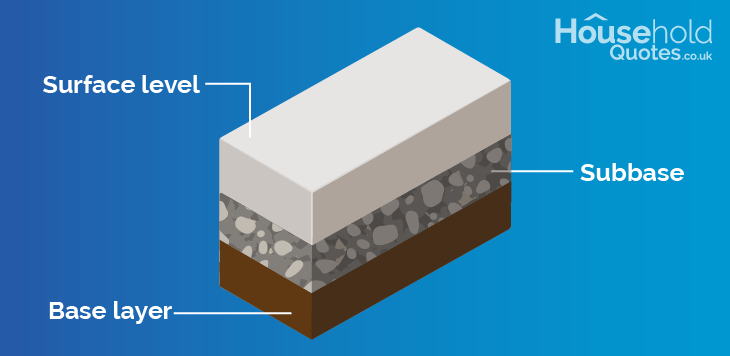
The base layer involves excavating the site and adding in the weed barrier. Depending on the driveway's slope, the excavation depth should be between 50 mm and 200 mm, according to Driveway Paving.
A level surface is necessary for a gravel driveway, so the base layer is crucial. It provides support and stability for the other layers. Completing this step is crucial to ensuring a solid and durable driveway.
To ensure a weed-free and well-draining driveway, add a geotextile layer or weed barrier on top of the excavated area before adding the subbase material. This layer prevents weed growth and separates the subbase from the ground, allowing rainwater to pass through and create better drainage.
A sub-base is a critical component when installing a gravel driveway and is considered the middle layer. It is placed on top of the geotextile member and provides the necessary load-bearing ability to withstand heavy traffic, preventing sinking and rutting.
A gravel driveway sub-base depth can vary between 100 mm and 150 mm, depending on the size of your driveway and the weight of your cars. The correct depth must be achieved to avoid any damage to your driveway.
The final step is adding a surface layer of gravel. It's important to note that this layer is purely decorative, so be careful not to add too much.
Adding an excessive amount will not provide additional benefits and will be more expensiveTherefore, adding a maximum depth of 50mm is recommended, according to Mainland aggregates. Once this step is completed, your gravel driveway is ready for use.
What is the recommended gravel size for driveways?
Choosing the right gravel size is crucial as it directly influences the driveway's performance, durability, and aesthetics. The size of the gravel impacts various factors, such as stability, drainage, and surface texture. Mainland Aggregates recommends using 20 mm gravel size for driveways.
Larger gravel sizes provide better stability and durability, which helps to prevent shifting and rutting, particularly in areas with heavy traffic. They also allow for better water drainage, reducing the risk of erosion.
While smaller gravel may initially provide a smoother surface, it lacks the stability required to withstand the weight of heavy traffic. Furthermore, small sizes 6mm to 10mm are more prone to movement and can be hazardous during rainfall or snow and ice, resulting in car skidding and falls. Therefore, choosing the correct gravel size for your driveway is essential to ensure it is long-lasting, durable, and safe.
Do you need a gravel grid for your driveway?
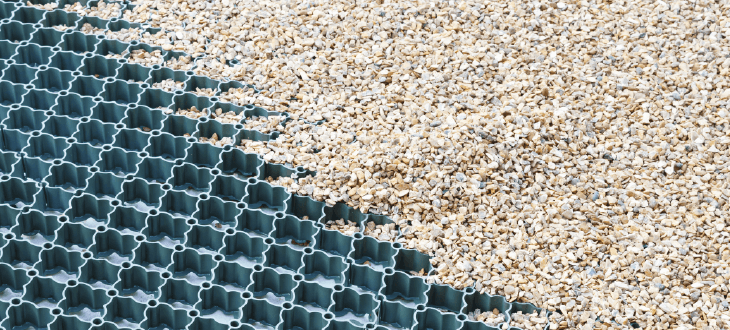
Gravel grids, also known as gravel stabilisers or grids, are a popular solution for increasing the stability and lifespan of gravel driveways.
Though not mandatory, they are highly recommended for driveways with heavy vehicle traffic, poor soil conditions, or erosion-prone areas.
You can opt for either plastic driveway grids or concrete ones and are designed to prevent gravel from shifting or sinking under heavy use. They are installed after the weed barrier has been placed.
After filling and levelling off the gravel, the grids' walls reinforce and evenly distribute weight, preventing gravel displacement, rutting, and potholes.
The cost of a new driveway will increase if grids are added, but the long-term costs must be considered.
Using grids can reduce the need for frequent maintenance, such as grading or replenishing gravel, saving money in the long run.
How much do gravel driveways cost?
The average cost of a driveway gravel is around £2,500. However, gravel driveway costs in the UK depend on the size of the driveway, the type of gravel used, and the complexity of the design.
Here are the average costs of driveway stones depending on the size of your driveway.
| Driveway size | Average cost |
|---|---|
| One car (20m2) | £1,400 to £2,000 |
| Two cars (40m2) | £2,200 to £2,800 |
| Four cars (60m2) | £3,400 to £4,000 |
On average, you will pay between £35 to £55 per m2 for materials and £150 to £200 per day for labour costs. The more time spent installing your driveway, the higher the labour costs.
Materials of gravel contribute to 25% of the overall cost, according to Price Your Job. Suppliers sell gravel in bulk bags and below is a table indicating the prices per ton of the most commonly used stones for a driveway.
| Gravel material | Average cost per tonne |
|---|---|
| Crushed rock | £52.25 |
| Pea gravel | £106.50 |
| River rock gravel | £57.60 |
| Self-binding gravel | £95 |
| Marble chip gravel | £160 |
Several factors influence the prices of materials:
- Production Costs: The cost of production can vary depending on factors such as labour wages, energy, and transportation expenses. Regions with lower production costs may offer cheaper materials.
- Supply and Demand: Changes in supply and demand affect material prices. High demand and limited supply increase prices. Conversely, prices decrease when supply exceeds demand.
- Location: Transportation expenses can significantly impact material prices, particularly for bulky or heavy items. Materials sourced locally may be more affordable due to lower transportation costs than those transported over long distances..
- Quality and Grade: Higher quality materials often have a higher price due to superior performance, durability, or aesthetic appeal, leading to increased demand and prices.
If you're considering installing a new driveway and using crushed rock due to its low cost, there are some drawbacks you should keep in mind. While it's a durable material, it could look more attractive and can often make your driveway dusty. Consider using river rock or pea gravel instead if you want a more visually appealing option.
What are the regulations for gravel driveways in the UK?
Gravel driveways in the UK do not require planning permission, as they fall under permitted development. However, it is essential to note that if your property is on a conservation site or protected land, obtaining planning permission may be necessary for any modifications to the property, including adding gravel to the driveway.
In addition, planning permission will be required if you plan to alter the access to your property, such as dropping the curb outside your home. It is important to be aware of these regulations to avoid any legal complications in the future.
It is best to consult a driveway specialist if you are still determining whether you must comply with regulations or obtain planning permission for your driveway. However, finding the right specialist in your area can be time-consuming, as you need to compare quotes and verify the reputation of the installers.
Household Quotes can help you here. We offer a service that provides you with four free quotes from trustworthy local driveway installers. They can answer all your questions and ensure you get the best service possible. Fill out our quick 30-second form to receive your non-binding, free quotes as soon as possible.
- Describe your needs
- Get free quotes
- Choose the best offer
It only takes 30 seconds

FAQ
Gravel driveways are a good idea as they are affordable, durable, and long-lasting. There are multiple types of gravel, so you can choose one that suits your needs and personal preferences while staying within your budget.
No, you cannot just put gravel down for a driveway. To ensure that your driveway is suitable for heavy usage, such as car and foot traffic, you will need to install three layers of gravel. The gravel is added last and is only installed for decorative purposes.
Crushed rock is the best gravel driveway material as it is both the most durable and cost-effective. However, choosing the best type of gravel will depend on your needs and personal taste.
To ensure that your gravel driveway stays durable and requires less maintenance, installing a weed barrier and sub-base is essential. The weed barrier will prevent weed growth, reducing the need for constant maintenance.
The sub-base is the most crucial part of gravel installation, as it evenly distributes weight across the driveway, preventing any sinking or potholes. Therefore, it is necessary to install both a weed barrier and a sub-base for a long-lasting and low-maintenance driveway.
20mm gravel is recommended for a driveway for better stability and durability. By increasing the size of the gravel, you can ensure that your driveway has a long lifespan.
Smaller gravel, such as 6mm or 10mm, is considered too small and is more prone to movement. This decreases your driveway’s lifespan and can be hazardous during rainfall or icy conditions.

Caoimhe is an experienced content writer and researcher who is passionate about providing accessible information to every reader. With a background in English literature and Sociology, she combines the two disciplines to create cohesive, well-thought-out, and well-informed pieces.
- Your Complete Guide to Gravel Driveway
- What is a gravel driveway
- What are the pros and cons of a gravel driveway
- What is the best gravel for driveways
- What are the layers of a gravel driveway
- What is the recommended gravel size for driveways
- Do you need a gravel grid for your driveway
- How much do gravel driveways cost
- What are the regulations for gravel driveways in the UK
- FAQ
